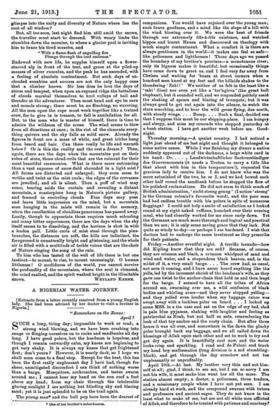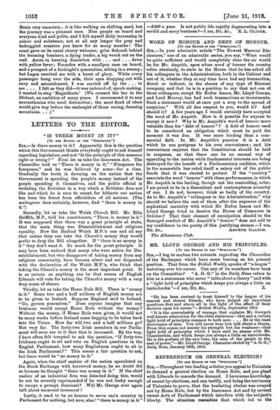A NIGERIAN WATER JOURNEY.
[Extracts from a letter recently received from a young English lady. She had been advised by her doctor to visit a brother in Nigeria.] "Somewhere on the Benue : April I
SUCH a long, tiring day; impossible to work or read; a strong wind blowing, and we have been crashing into snags or flinging ourselves on to rocks and sandbanks all day long. I have good polers, but the headman is hopeless, and though I remain outwardly calm, my knees are beginning to get very shaky. It is always my knees that get frightened first ; don't yours P However, it is nearly dark, so I hope we shall soon come to a final stop. Except for the heat, this has been the first really unpleasant day I have had, though for sheer, unmitigated discomfort I can think of nothing worse than a barge. Mosquitoes, cockroaches, and tsetse swarm around me ; I cannot bear my hand on the sun roof a foot above my head; from my chair through the intolerable glaring sunlight I see nothing but blinding sky and blazing sand; yet it is just splendid to be on the trail again.
The young man* and the bull pup have been the dearest of
* One of her brother's subordinates.
companions. You would have rejoiced over the young man; such brave goodness, and a mind like the slope of a hill with the wind blowing over it. We were the best of friends through our extremely ate-a-rete existence, and watched hippos and learnt Hausa and discoursed on theology with much simple contentment. What a comfort it is there are always gentlemen in the world—it makes one feel so safe— like policemen and lighthouses ! Three days ago we passed the boundary of my brother's province—a monotonous river; only its bigness makes it beautiful, but occasionally things have come down to greet us, and I feel very far away from Chelsea and waiting for 'buses at street corners when a hundred men kneel at my feet and the hillside shakes to the thundering Zaki ! ' We neither of us felt in the least like a zaki ' (lion) nor even yet like a toengirva ' (the great bull elephant), but it sounded well, and we responded politely amid the shaking of spears and blaring of trumpets; but it was always good to get out again into the silence, to watch the stars marching, and to hear the wild geese flying, due north, with steady wings. . . . Bump. . . . Such a final, decided one that I suppose this must be our stopping-place. I am hungry and sleepy, and miss my comrade who stopped yesterday at a bush station. I have got another week before me. Good- night.
Thursday morning.—A quaint country. I had noticed a light just ahead of me last night and thought it belonged to some native canoe. While I was finishing my dinner a native suddenly appeared out of the darkness, a large white card in his hand : Dr , Landwirtschaftlicher Sachveratiindiger des Gouverneinents (it needs a Teuton to carry a title like that about with him in this temperature !), requested the gracious lady to receive him. I do not know who was the more astonished of the two, be or I, and we had bowed each other half round the sandbank before be stopped the flow of his polished exclamations. He did not seem to think much of British administration, nicht streng genug ' (I notice ' streng' is the German colonial's favourite word), and the poor man had had endless trouble with his polers in spite of numerous floggings! I could not help a smile of satisfaction as I looked round at my eight naked ruffians, hunched over their evening meal, who had cheerily worked for me since early dawn. Yet the Germans are much more thorough and logical and practical than we are; it is only some saving grace that they lack. Not quite so windy to-day—or perhaps I am hardened. I wish that doctors had to undergo the same treatment as they prescribe for their patients.
Friday.—Another eventful night. A terrific tornado—how did Kipling know that they are red ? Because, of course, they are crimson and black, a crimson whirlpool of sand and wind and water, and a stupendous black heaven, and, in the midst of it, a very small barge. . . . The crew bad, as usual, not seen it coming, and I have never heard anything like the yells, led by the incessant shriek of the headman's wife, as they gave one twist to the anchor-chain that held us and then leapt for the barge. I seemed to have all the tribes of Africa around me, swarming over me, a wild confusion of black bodies and whirling arms—and they never stopped yelling— and they yelled even louder when my baggage canoe was swept away with a luckless poler on board. . . . I locked up some MSS. in a tin case and sat on the edge of my bed, clad in pale blue pyjamas, shaking with laughter and feeling as patriarchal as Noah, but not half so safe, remembering the look of that toy anchor and the rusty chain. But after three hours it was all over, and somewhere in the dawn the plucky poler brought back my baggage, and we all called down the blessings of Allah upon each other and set to work to try and get dry again. It is beautifully cool now, and the water looks crisp and sparkling. I read and do Pulani and teach my head boy mathematics (long division is a sad stumbling- block), and get through the day somehow and not too unpleasantly or unprofitably.
April 10th.—At last. My brother very thin and not him- self at all ; glad, I think, to see me, but I am so sorry I am not his wife, it must make him want her all the more. The station almost empty; a doctor, a policeman, three traders, and a missionary couple whom I have not yet seen. I am already bard at work, and the compound swarms with tutors and professors and ancient sages. They do not know in the least what to make of me, but are not all white men afflicted of Allah, and therefore to be treated with patience and courtesy?
Brain very uncertain ; it is like walking on shifting sand, but the journey was a pleasant cure. Nice people on board and everyone kind and polite, and I felt myself daily increasing in colour and substance, not at all any longer the grey and bedraggled creature you knew for so many months ! The coast gave us its usual cheery welcome; grim Sekondi behind the booming breakers, a dying trader, a big wreck out on the reef. Accra in burning desolation with . . . and . . . down with yellow fever ; Foreados with a smallpox case on board, and a prospect of a fortnight's quarantine, sitting in a swamp ; but Lagos received me with a burst of glory. 'While every passenger hung over the side, their eyes dropping out with envy and astonishment, I was carried off by the . . . to see . . . I felt as they did—it was unheard-of, epoch-making. I wanted to sing 'Magnificats! (We crossed the bar in the lifeboat, an ambition of many years. I recommend it to any neurasthenics who need distraction ; the most fixed of ideas would give way before the onslaught of those racing, foaming mountains. . .











































 Previous page
Previous page